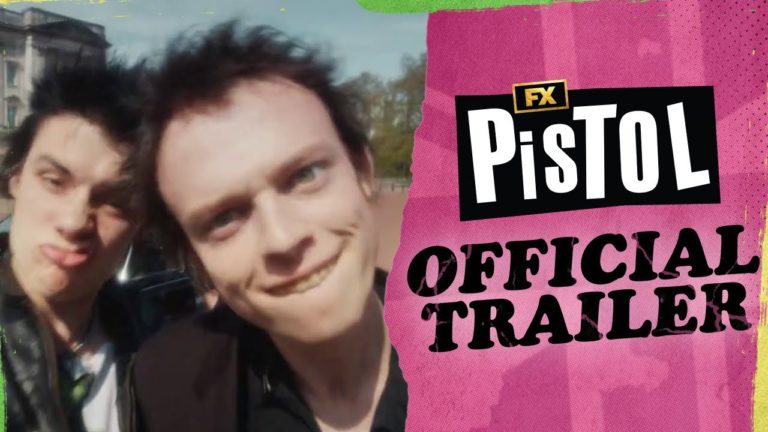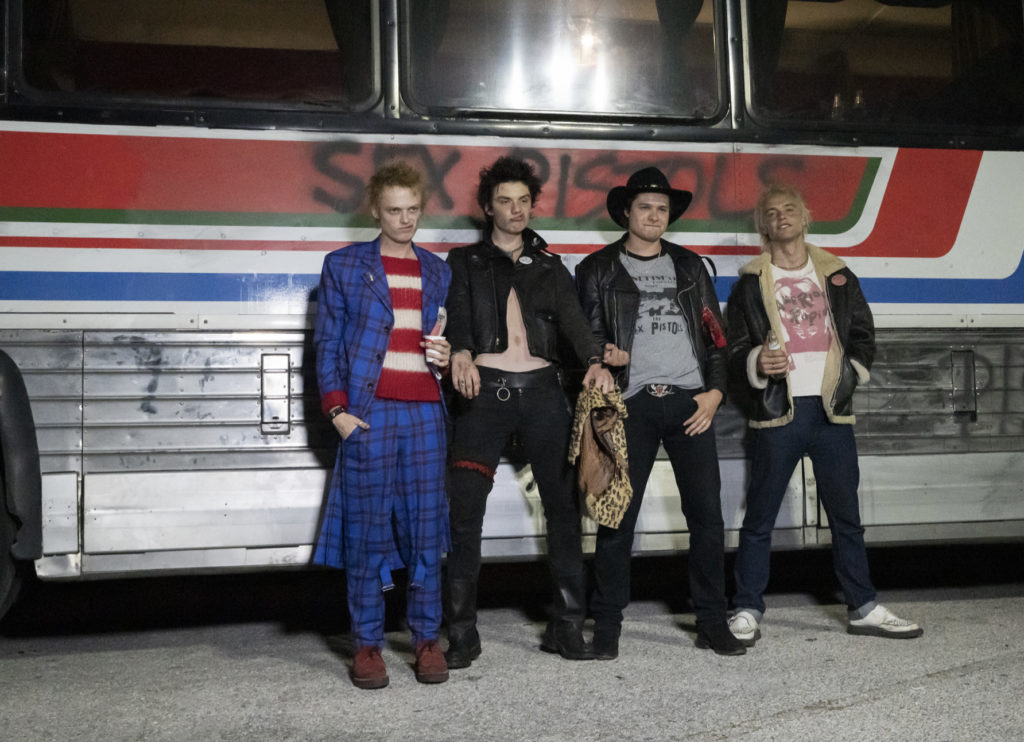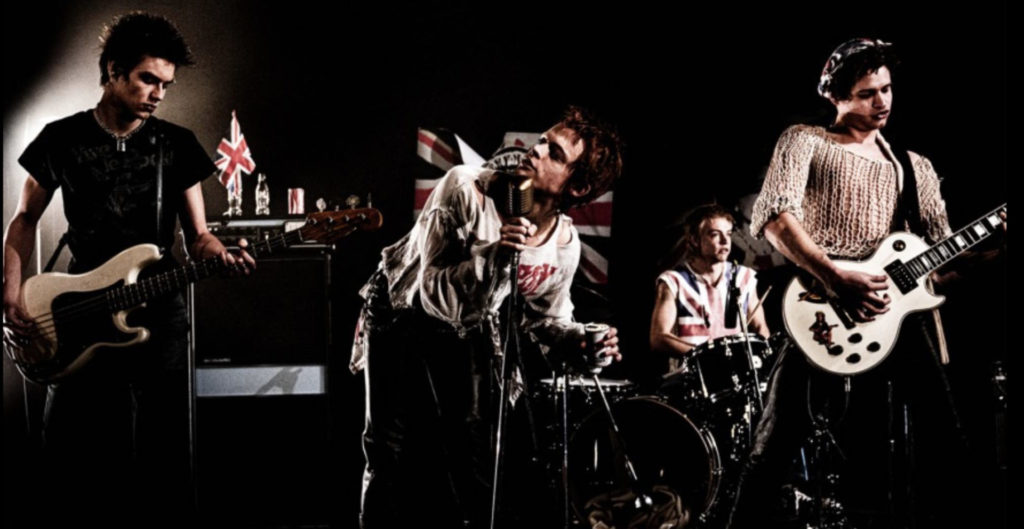
Oscar-winning Slumdog Millionaire and Trainspotting filmmaker Danny Boyle says he always wanted to tell the story of the short-lived, but influential punk rock band, Sex Pistols.
His dream became reality as he directed and executive produced Pistol, the six-part adaptation of musician Steven Jones’ memoir, Lonely Boy. The miniseries began streaming in its entirety on Hulu Tuesday.
Boyle and the cast recently took part in a virtual press conference to promote the drama. Here is what he and actors Toby Wallace (Jones,) Anson Boon (Johnny “Rotten” Lydon,) Louis Partridge (Sid Vicious,) Thomas Brodie-Sangster (Malcolm McLaren,) Jacob Slater (Paul Cook,) Christian Lees (Glen Matlock,) Sydney Chandler (Chrissie Hynde,) Talulah Riley (Vivienne Westwood) and Emma Appleton (Nancy Spungen) told reporters about the legacy of the group that gave the world edgy, memorable songs like God Save the Queen, Anarchy in the U.K., Holidays in the Sun, Pretty Vacant, Bodies and I’m Not Your Stepping Stone.
(Questions edited for clarity.)

Q: Danny, did you feel a real kinship to the Sex Pistols because they were born rebels who upended British popular culture?
DB: Yeah, yeah, very much so. One of the things that we did when we started was just talk about how incredibly dull Britain/England was. I can remember trying to explain because your lives are so full now – there’s so many opportunities not just for you, but everybody, there’s so much in the world – and there was so little then. You felt like it was kind of, well, it wasn’t just kind of flat, it was kind of timed. You felt like you were young and then you were old, and there was nothing in between. And they did something, the Pistols, they were the fountainhead that changed it for so many other people coming after them.
And I think what they did is they gave a sense of timelessness. They said, “This is yours.” And what was different about them is they said that you can do whatever the fuck you want with it. You can waste it, be vacant, be futile or not; it’s up to you. And nothing ever seemed to be the same again, especially for working class people, I think. It was like you didn’t just put your shoes on and follow your dad into the factory anymore. You could do whatever the fuck you want with it. That is proper counterculture, because it is an ignition point, which Malcolm especially goes on about – trying to create this chaos.
Q: From a practical point of view how is it to direct chaos?
DB: It definitely changes the way you shoot. We definitely tried, with Anthony Dod Mantle, our cinematographer, we tried to let the actors have the scenes, and then you get like that camera just moved, you get the cameras to try and follow it. And what we did, I remember very clearly thinking, ‘Fuck, we haven’t got a closeup of Vivienne saying that line.’ And that’s the order of things. That’s the conventional thing, is you need a closeup of that line, you’ll need that closeup to finish that scene. And we self-sacrificed that and we went for something else instead, which is the feel of the scene in the hands of the actors.
You are held by that because they have these songs and you can’t really interrupt the songs, you know, they got to play the songs. And they did. They got very, very good at playing the songs.
So, the way that we would cover them on stage or in rehearsal became the kind of style by which we try and shoot the piece.
And it became about being able to be in the room with them, whatever was going to happen, rather than go, ‘No, listen, I am telling you, you have got to be ordered like this.’ And it is what we do, you tend to order things, and you lose something with that. You gain stuff with it, but you definitely lose something with it, as well. So, that’s what we tried I don’t know what it was like for you guys, but that’s the philosophy that we tried to bring to it.
TW: It really felt like chaos. It really did.
Q: The Pistols were completely unlike previous trendsetters, weren’t they?
DB: Every teen and music generation lays claim to that, I think, understandably. But I don’t think there was ever anybody who did it as excessively, extremely, as aggressively as this lot and who were so unqualified to tell us so in the sense of, you know, what qualification normally means. They were supremely unqualified to do anything. They weren’t really from art school, you know, like previous like the Beatles were, for instance. They really were from the street. So, it was the triumph of street culture, or counterculture, for sure.

Q: Why do they remain relevant today and why is now a good time to tell their story?
DB: Somebody was just saying about the social media, what would they do now with social media if they had emerged, if something like this emerged? My instinct is that Malcolm’s direction would be to always challenge the order of things, and whenever anything gets said, is to blow it up, really. And that was part of the journey I went on with. I understood it in theory, out of chaos comes creativity, but I didn’t really understand it, about how it created this music. And that’s what I hope we achieve with the show, is that we tried to make it in a way that disobeyed the order of things. … What we were trying to do was create a kind of chaos in the way that we made the whole series and constantly trying to contradict the order of things, and that out of that chaos, then, you would hope that something would be born. Culture should always do that, I think. It should always challenge the order of things, because the order of things is stultifying.
Q: Do you think the real Johnny “Rotten” Lydon will attack your version of events?
DB: We just know he will. And we love him for that, actually. … It is that contrary nature that is the source of a wonderful touch of genius, really. Something very, very special.
Q: Toby and Thomas, what was it like playing such over-the-top characters: band member Steve and the group’s manager Malcolm?
TW: Obviously, the script is based off of Steve Jones’ autobiography, so I felt very blessed in the sense that I had always the book as a guide for everything. And especially towards his relationship with Malcolm, he talks about their kinship together and how similar they were to a certain extent. I remember at one point him saying that Malcolm came from a very similar kind of childhood as him. They both had broken families. They were both from kind of a broken world and were seeking sort of some way to express their past. I guess it was nice because I had the book, and then I had also the real Steve I got to meet and hang out with quite a bit. So, I always got to contact him for any type of thing, like for context in the script or anything like that. But I think at the heart of him and at the heart of our story was this traumatic experience that he had gone through that birthed that type of anger that I think he shares with Malcolm, and out of the anger was birthed the Pistols because a lot of people could relate to that, especially from these kind of working class places and these working class people. So, that was kind of the key for me personally.
TBS: I have never played anyone quite as outrageous. He’s quite out there and quite mad, really. So, it was a real fun challenge to try and ground that and make that real. So, I mean, unfortunately Malcolm’s dead now, so I didn’t have the luxury of meeting him and hanging out with him at all.
But we had a fantastic team of researchers that just supplied us with all sorts of videos and imagery, recordings that really helped, you know, find the nuances of the way he sounds, the way he holds himself, how he conducts himself. And there was so much detail there, it was really fun to just kind of dive in there and really start playing around. And we had weeks and weeks and weeks of rehearsals to experiment, and Danny really encouraged that experimentation.
Q: For the other actors playing the Pistols, what surprised you about them and do you think they could get away with all their antics nowadays when social media and cameras are so prevalent?
TW: I do remember when we walked in to start rehearsal, one of the first things I remember Danny saying to us is, “Oh, your generation is so stimulated all the time.” Even the clothes we were wearing and the stuff we were listening to, we are always so stimulated as a generation. I think that really wasn’t the case back in the ‘70s. It was pretty grim. It was kind of postwar. It was very, I guess, bleak in terms of stimulation, to that standpoint. That was just kind of one of the first things that I remember being surprised by. And we got to play with that, I guess, as Pistols, because they were outrageous.
LP: I don’t know if there’s the same space – I don’t know what you guys think – to break the mold in that way. You guys all dress very funkily. We all have self-expression in that way. So, I don’t know if there is that same opportunity.
AB: I was really surprised by some of their songs. I didn’t know them as well as I do now.
But I knew they were talented, but not just how talented they were and the journey that they went on. And it might not be the conventional form of talent because they didn’t go to music school or something like that, but what they did was so unique and so impressive, I was just blown away by it. And I always think, like, a really good measure is if you look at their first song, Lazy Sod. It is three guitar chords, and then you look at one of their last songs, Holiday in the Sun, there’s like two key changes. So, just that journey they went on, the progression. As an actor, it was amazing to explore. It was like a real gift. So, yeah, I was blown away by that.
Q: Anyone else want to say specifically what they like about the band’s music?
TW: The simplicity that’s behind the music and always keeping it simple, but really raw. And the music always felt to me it was the really raw expression of a class that was underserved and underrepresented. And they expressed it in their own way from the streets, and that’s what everybody related to. But that’s the thing that always struck me about their music, was that it was just so raw and so kind of rugged and they didn’t try to overcomplicate it or make it this kind of big show, kind of showboating, performance-type thing. It felt very truthful.
LP: I remember, Danny, one of the first things you told us when we were learning about them was that when you went to see them perform, they were always within reaching, touching distance, whereas people out here I see a lot of nodding heads, whereas Bowie and other artists would have been, you know, their own thing that you could sort of almost praise. The Sex Pistols, as you say, they were rugged and they were sort of down to earth in a relatable way, which I have never seen before. … You asked about whether I liked their music. I knew of it before I even questioned whether I liked it or didn’t like it, which I have never had before. I wasn’t a massive fan before, but I wasn’t educated. And having [screenwriter] Craig [Pearce] be here and Danny and then this whole show, and now, like, the context behind it is so important. What the show does so well is just inform you of everything that was going on, and I hope that it does the same for kids and anyone really who thinks they know about the Sex Pistols, and even if they do.
TBS: You’re just hit by this ball of exposed anger, but it comes from the more you listen to it, it sounds angry at first, and it is angry, but comes from a place of truth, too. They’re unapologetic about the way they feel about the world. And they express it with just pure energy, and that’s what’s so striking about them.

Q: What does the band represent today?
AB: What really touched me was just this story that these five working class boys that weren’t supposed to do anything, and these five working class boys revolutionized music, fashion and culture forever.
Now that I know so much about them, it’s impossible not to see them in my everyday life. If you go into a pub, their font is on a beer pump. All the major fashion houses still put safety pins in their clothes. It’s everywhere. And I think that that story of the underdog really working on what they wanted to do, breaking of their situation, succeeding and absolutely dominating what they wanted to do, I think that will always be a story worth telling and it will never not be relevant.
CL: Yeah. I think what the main thing to me was and what it taught me was the impact of bravery. As Danny was talking about, these young kids, and just to be brave, to not care in such a world where everything had such order and to just not care when everybody is under the same establishment is extraordinary for where they came from and how it does still affect us today, as Anson was saying, how you still see them everywhere. You see the font everywhere and their influence in music.
And just to think that in a time where almost in the opposite way, when Danny was saying how London was so dull and how you would have to wait four hours at a pub if someone didn’t show up, instead of just text them saying, like, ‘Where are you?’ Like, you’d just have to wait. And I think we are almost at the opposite. And so, I think it’s good now, because I think we are overstimulated. And I think someone will be late now because they’re scrolling on social media, as opposed to, you know, not having enough stimulation. So I just think it is the right time that their impact is still here. So yeah, that’s my take on that.
JS: I think it is pretty wonderful they kind of show you, like, how wonderful things can be if you dare to kind of get away from the middle of the road, you know. And even if it kind of crashes and burns, you know, at least you did it. At least you went in there and did something that wasn’t normal, you know, give me anything but normal.
And, yeah, I hope kids today can watch that and take a look around them and say: ‘Actually, you know, maybe this is what all of my friends are doing, and it feels like something, but maybe I should go against that. Maybe I should really use my own mind.’ So, I don’t know. Hopefully they can inspire people to do that a bit, because that’s what they represent to me.
Q: How do the female characters Vivienne Westwood, Chrissie Hynde and Nancy Spungen fit in the story?
TR: It was really fun playing Vivienne, who is an icon in her own right. And in terms of impact and, you know, name recognition now, she is, one could argue, as big, if not bigger than the Sex Pistols. And I think it was great, you know, because it is all very well for Malcolm to say, you know, ‘Chaos is creativity, et cetera,’ but then cut to Vivienne working away in her overalls, you know, boiling bones to actually kind of make his vision come to life. So, I felt like she was a counterpoint to the philosophy, which was quite fun to play.
SC: There’s a focus in the show on the kids they were before they became these legends. And I think that was quite important for me going into finding character and relating to this kid, this teenager, this young adult who wasn’t known by anybody, who hopped ship and came over here all on her own. Chrissie Hynde is also quite up there with the Sex Pistols. You know, she left her mark, and she persevered. And she knew what she wanted, and she kept at it. And I learned a lot from that. I am very thankful to play someone like that. Learned a lot from that.
EA: They are all such iconic women in their own right. They have their own personalities. They weren’t just the girlfriend of Sid Vicious or the paramour of Malcolm McLaren. You know their names and legacies, as well. They weren’t just kind of like, you know, an accessory to these men in the story, and very much had their own success. So, I wouldn’t say that it was difficult to kind of bring that to the screen. It was already very much there for us to just harness their power.
Read more stories by Karen Butler.
Here’s the trailer of the film.
https://www.youtube.com/watch?v=9KhxwG0eCiE

